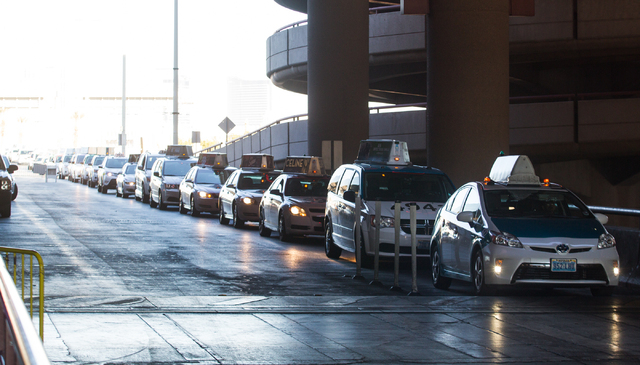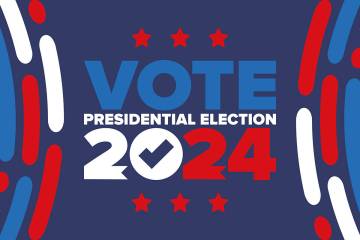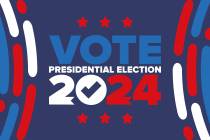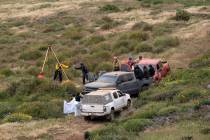Taxicab Authority officers say they’re not allowed to fully enforce the law
The Nevada Taxicab Authority’s officers could do a better job enforcing laws regulating the taxi industry if only they were allowed to do so, according to two authority investigators.
Instead, the investigators say the administration discourages officers from writing lots of citations to cabbies for violations, including long-hauling.
Long-hauling occurs when cabbies take passengers on a longer-than-necessary trip to their destinations, boosting fares without their permission. The most common victims are tourists and other visitors arriving at McCarran International Airport with Strip resort destinations.
The taxicab authority’s situation also has caught the attention of state agency directors at the Nevada Department of Public Safety and Nevada Department of Business and Industry, said Ron Cuzze, president of the Nevada State Law Enforcement Officers Association.
The agencies reached out to the association, which represents taxicab authority employees, and the parties had a teleconference several weeks ago, Cuzze said.
He echoed the investigators’ concerns and said his association hears similar concerns from authority police officers.
“They are extremely hampered in the execution of their law enforcement function, which is both a public safety issue and an officer safety issue and also an industry issue,” Cuzze said of the authority investigators.
It’s the latest development for the taxicab authority. A private conversation between Ruben Aquino, the authority’s chief investigator who supervises the officers, and another investigator, Antoine “Chris” Rivers, has emerged in a recent court case. The conversation from December 2012 raised concerns among the authority’s rank and file. In that conversation, the two talked of how the authority’s officers cannot be heavy-handed and said that the authority’s day-to-day operations are overseen by cab owners, records show.
On behalf of state law enforcement officers, Cuzze’s association handles grievances, including those of the investigators with the authority.
BLAME PLACED
The authority has about 26 investigators, who are all sworn law enforcement officers. It is charged with regulating the taxicab industry in Clark County, a state operation that falls within the Nevada Department of Business and Industry. The investigators also do more than write long-hauling tickets. They can cite drivers for other traffic infractions, make arrests, do patrols and surveillance and deal with situations involving conflicts between drivers and passengers, such as passengers who don’t pay their fares and potentially fraudulent activity.
Cuzze said the problem lies with the authority’s civilian administrator, Charles Harvey, who took over the agency in 2011 following the departure of Gordon Walker.
“The problem is, they’ve always had a civilian administrator in there and the current one is the worst we’ve ever seen,” Cuzze said. “He can’t understand they are cops and they are sworn to uphold the Constitution of the United States and enforce the state constitution and state laws.”
Cuzze stopped short of saying Harvey needs to be removed for the authority’s problems to end.
“I would hope he would not lose his job, but he needs to perhaps change his own culture,” Cuzze said.
Cuzze noted that the problem extends beyond long-hauling to other enforcement issues.
For example, officers fear retaliation if they intervene in a situation that doesn’t involve a cabdriver or passenger, but needs quick help from a law enforcement officer, Cuzze said.
In those situations, authority investigators, who are in marked patrol cars, should be able to immediately assist before handing the case over to the agency with jurisdiction, Cuzze said.
Harvey and other authority administrators did not respond to messages seeking comment.
James Wright, director of the Nevada Department of Public Safety, and Bruce Breslow, director of the Nevada Department of Business and Industry, couldn’t be reached for comment.
Cuzze said it’s too soon to say what the solutions might entail that will help authority officers feel that they can do their job and enforce laws without fear of retaliation.
While critical of the authority’s administrator, Cuzze said he’s encouraged that others in state government have expressed interest in improving the authority. He also stressed that he has no problem with the officials above Harvey, from the director of business and industry to Gov. Brian Sandoval.
“We’re trying to do everything possible to do the right thing by our officers, the taxicab industry and the public,” Cuzze said.
Long-hauling is widespread in Clark County. The practice cheated the riding public out of nearly $15 million in a year’s time, according to the estimate in a state audit released in April 2013. That audit found that nearly one-fourth of the rides sampled from McCarran airport to Strip hotels were long-hauls. In 2013, 3.6 million cab rides began at McCarran, a daily average of 9,863.
DISINCENTIVES TO WRITING TICKETS
Authority investigators said the efforts to reduce citations have come in different methods over the years. They spoke only on condition of anonymity, as they could face retribution — including termination — if named.
For several years, a former administration instructed prolific ticket-writing investigators to spend time in an office instead of out in the street, authority staffers said.
Among the options: watch a movie, drink coffee or go to casinos.
Now, investigators are burdened with additional paperwork requirements. The paperwork consumes time that would otherwise be spent on active enforcement, investigators said.
“What they’ll do is they will come up with unnecessary and burdensome paperwork just to keep you busy,” an investigator said.
The paperwork requirements, which aren’t uniform throughout the authority, are used to stifle productivity. They fluctuate for individual employees based on how many citations they write, investigators said.
For example, sometimes investigators are required to fill out a report and make several copies for simple incidents such as a call to help a driver that is canceled and requires no enforcement action.
Taxicab authority employees had concerns after hearing the conversation recorded in December 2012 between chief investigator Aquino and Rivers.
That conversation, reported in the Review-Journal on Feb. 16, took place in Aquino’s office with the door closed.
“We’re governed by the Department of Business and Industry,” Rivers said in the conversation, court records show. “But we oversee the cab owners and certificate owners, who oversee our day-to-day operations.”
Aquino responded: “We can’t go out there and be (expletive) heavy-handed,” according to the audio and transcript.
At the time, Aquino didn’t realize his cellphone line was open and on a call during that conversation, court records show.
Another investigator, Joseph Morgan, heard them talking on his telephone and the conversation was recorded, according to court records. Morgan faces felony charges in Clark County District Court of interception of wire communication and surreptitious intrusion of privacy by a listening device.
Morgan has pleaded not guilty. His attorney, Robert Draskovich, has said the circumstances of the incident don’t fit within the framework of the state wiretap statutes used to charge his client.
Contact reporter Ben Botkin at bbotkin @reviewjournal.com or 702-387-2904. Follow him on Twitter @BenBotkin1.




























